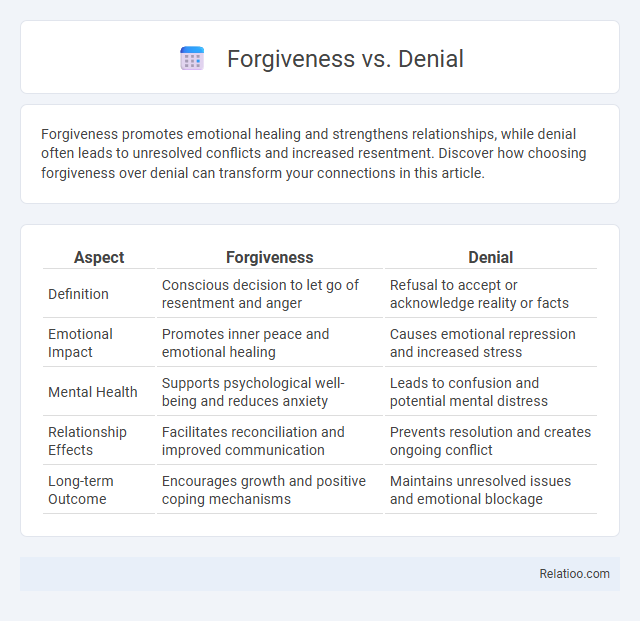Forgiveness promotes emotional healing and strengthens relationships, while denial often leads to unresolved conflicts and increased resentment. Discover how choosing forgiveness over denial can transform your connections in this article.
Table of Comparison
| Aspect | Forgiveness | Denial |
|---|---|---|
| Definition | Conscious decision to let go of resentment and anger | Refusal to accept or acknowledge reality or facts |
| Emotional Impact | Promotes inner peace and emotional healing | Causes emotional repression and increased stress |
| Mental Health | Supports psychological well-being and reduces anxiety | Leads to confusion and potential mental distress |
| Relationship Effects | Facilitates reconciliation and improved communication | Prevents resolution and creates ongoing conflict |
| Long-term Outcome | Encourages growth and positive coping mechanisms | Maintains unresolved issues and emotional blockage |
Understanding Forgiveness: Definition and Key Concepts
Understanding forgiveness involves recognizing it as a conscious, deliberate decision to release feelings of resentment or vengeance towards someone who has caused harm. It differs fundamentally from denial, which is the refusal to acknowledge the reality of a hurtful event, and from repression, where painful memories are unconsciously blocked from awareness. Key concepts of forgiveness include empathy, acceptance, and emotional healing, which contribute to psychological well-being and improved interpersonal relationships.
What is Denial? Exploring the Meaning and Impact
Denial is a psychological defense mechanism where Your mind rejects reality to protect against uncomfortable emotions or truths. It involves refusing to acknowledge facts or events, leading to distortions in perception and impaired decision-making. Understanding denial's impact helps differentiate it from forgiveness, which embraces acceptance and healing, whereas denial perpetuates avoidance and emotional blockages.
Psychological Effects: Forgiveness vs Denial
Forgiveness promotes emotional healing by reducing stress, anxiety, and resentment, leading to improved mental health and greater psychological resilience. Denial, as a defense mechanism, temporarily shields individuals from painful realities but often results in increased anxiety, unresolved trauma, and hindered emotional growth over time. Forgiveness facilitates adaptive coping strategies and better interpersonal relationships, while denial tends to perpetuate psychological distress and maladaptive behaviors.
Emotional Healing: The Power of Letting Go
Embracing forgiveness unlocks profound emotional healing by releasing resentment and fostering inner peace, whereas denial blocks awareness and prolongs pain. Recognizing your feelings instead of denying them empowers you to confront and process emotional wounds, facilitating growth and resilience. Choosing forgiveness over denial allows your heart to heal, transforming suffering into strength and restoring emotional balance.
Denial as a Coping Mechanism: Benefits and Risks
Denial as a coping mechanism allows your mind to temporarily shield you from painful realities, providing immediate emotional relief and reducing stress. However, prolonged denial can hinder personal growth, delay problem-solving, and exacerbate psychological issues by avoiding the acknowledgment of underlying problems. Balancing forgiveness with the conscious recognition of denial is essential for emotional healing and maintaining mental well-being.
Forgiveness in Relationships: Building Trust and Resilience
Forgiveness in relationships plays a crucial role in building trust and resilience by allowing individuals to acknowledge pain while choosing to move forward positively. Unlike denial, which ignores or suppresses the reality of hurt, forgiveness fosters emotional healing and strengthens relational bonds through empathy and understanding. Trust is restored when partners openly address conflicts, demonstrate accountability, and commit to growth together.
Denial’s Role in Preventing Personal Growth
Denial serves as a psychological defense mechanism that blocks your awareness of painful realities, hindering emotional processing and self-reflection essential for personal growth. Unlike forgiveness, which fosters healing and acceptance, denial creates a barrier that prevents confronting truths necessary for change and development. Understanding denial's role is crucial in overcoming stagnation and promoting genuine transformation in your life.
Steps to Move from Denial to Forgiveness
Moving from denial to forgiveness involves acknowledging your feelings and accepting the reality of the situation without minimizing its impact. You start by recognizing the pain and allowing yourself to experience it fully, which is essential for emotional healing. Next, practice empathy by understanding the perspective of others involved, enabling your heart to open and fostering the path toward genuine forgiveness.
Forgiveness and Mental Health: Scientific Insights
Forgiveness plays a crucial role in improving mental health by reducing stress, anxiety, and depression, as supported by numerous scientific studies. Unlike denial, which often leads to unresolved emotional conflict and prolonged psychological distress, forgiveness fosters emotional healing and resilience. Your ability to forgive can promote better emotional regulation and enhance overall well-being, reinforcing positive mental health outcomes.
Practical Strategies for Cultivating Forgiveness Over Denial
Cultivating forgiveness over denial requires acknowledging your emotions honestly and facing painful experiences without avoidance. Practical strategies include journaling your feelings, practicing empathy to understand others' perspectives, and engaging in mindfulness techniques to stay present with discomfort. These actions promote healing by transforming denial's resistance into forgiveness's acceptance and growth.

Infographic: Forgiveness vs Denial
 relatioo.com
relatioo.com